Parliamentary elections in South Africa will be held on May 8, 2019, for the sixth time since the end of apartheid in 1994. Africans will also vote for candidates in the provincial legislative assemblies.
In addition, a new president will be elected.
The current atmosphere
The atmosphere in South Africa in recent months is one of instability. This has more or less been the case since the removal of Jacob Zuma, who was replaced by Cyril Ramaphosa. Despite the change of power, people are still unhappy with the economic situation and have been even been ready to take to the streets in protest.
As for the internal political battles, the ruling party faces tough opposition, a situation which manifests itself even in physical public fights- while these battles can look ridiculous, it belies a situation that is deadly serious.
One such scandal was captured on local channel SABS News. Viewers saw members of the Fighters for Economic Freedom Party (EFF) and supporters of the Good party in an all-out scuffle. Members of the Land Party and Black First Land First also took part.
Election system
In total, 48 political parties will take part in the elections, many of them from new formations.
200 deputies will be elected on national party lists, and the remaining 200 – on provincial lists. The president is then elected at the newly elected National Assembly.
Provincial legislatures vary in size from 30 to 80 deputies and are also elected based on party lists. The provincial premiers are elected at the provincial assemblies.
Serious issues facing South Africa
One of the painful issues remains the land issue – in particular, the expropriation of land without compensation.
Another serious topic is the ethnic question. President Cyril Ramaphosa was even forced to call for publicly eradicating racism and xenophobia in the country 25 years after the end of the apartheid regime.
In the economic sphere, the situation remains dire. Unemployment, crime, poverty, corruption and housing are major issues facing South Africans.
Main fight
The African National Congress, under the leadership o Ramaphosa, is fighting to maintain a majority in the National Assembly and keep its hold on the presidential office.
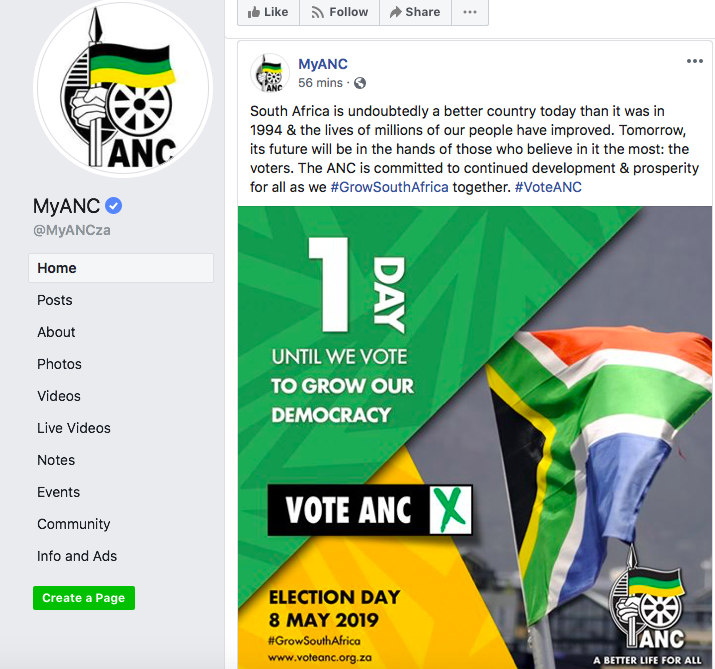
Ramaphosa took the lead in the country as a result of the removal of President Zuma, as part of an internal struggle of the ruling party. Ramaphosa himself represents the interests of big business.
The main parties expected to claim victory are the ruling African National Congress (ANC) of Ramaphosa and the opposition Democratic Alliance (DA).
In the 2014 elections, the African National Congress received 66% of the vote. Despite the victory, the party lost 15 parliamentary mandates compared to previous elections.
Political attacks are directed mainly against ANC Secretary General Ace Magashule – he is regularly accused of corruption in the media and even members of the ANC’s top leadership.
At the same time, there is an increase in the popularity of the Democratic Alliance, which over and over again has increased its faction in parliament. If in 1999 the DA received only 1% of the vote, in the last elections of 2014, the DA became the main opposition party, receiving 22%
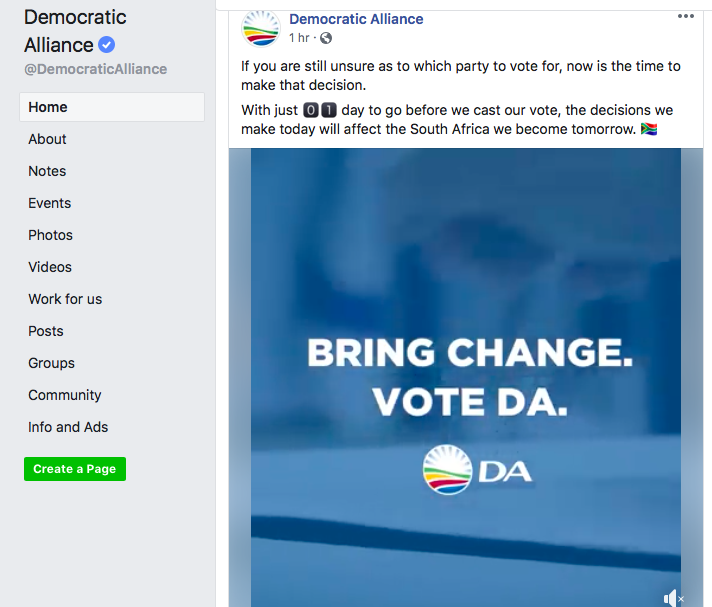
As a rule, the Democratic Alliance is criticized for “white capitalism” (according to critics, it protects the interests of the white population and Western capital).
Competitors
Both for the ANC and for DA, the main danger comes from second-tier parties that can be decisive in who will receive the right to form a government.
The left flank of the political parties of South Africa is wide but has very little unity – unlike the smaller right flank, which is almost completely united in the Democratic Alliance.
The Party of Fighters for Economic Freedom (EFF) is one of the main players. In the 2014 elections, the EFF received 6% of the vote. Moreover, the EFF has shown itself to be a decisive political force in a situation where none of the parties can boast an absolute majority. Moreover, the EFF may enter into a coalition with the Democratic Alliance.
Among other forces, the Socialist Revolutionary Workers’ Party (SRRP) is also interesting. It was created just a few weeks ago on the basis of the largest trade unions — the Union of Metallurgical Workers (NUMSA), the largest union in the country (about 350 thousand members). The SRRP program states that the aim of the party is to build a socialist state on the basis of Marxism-Leninism.
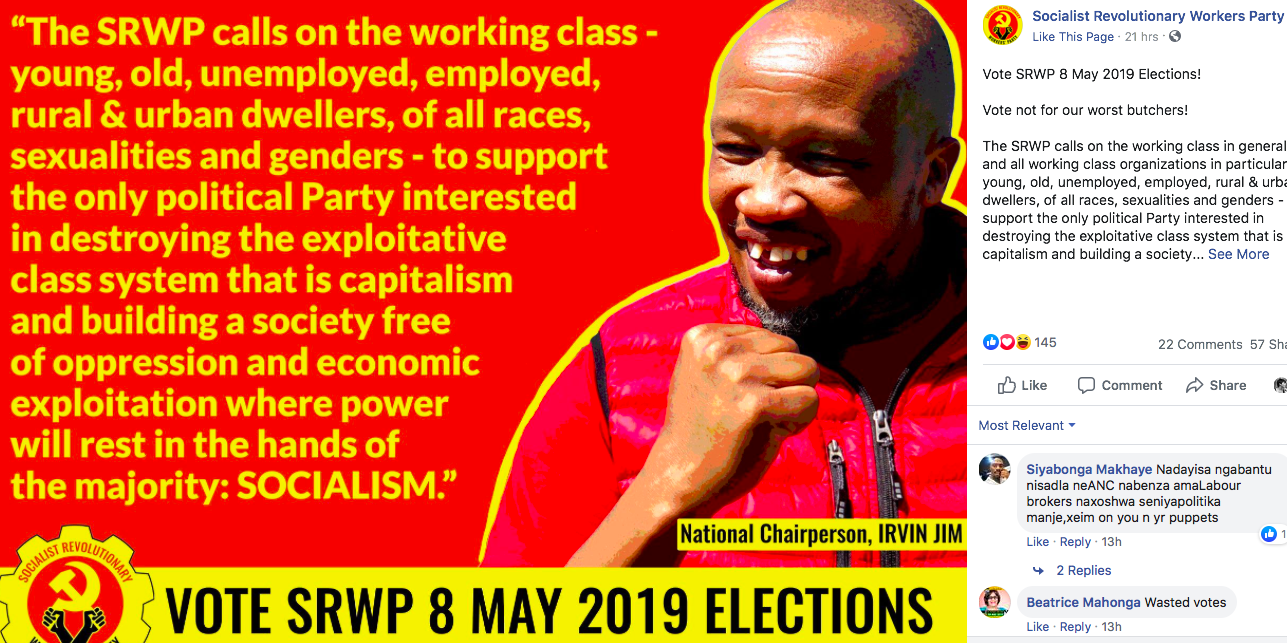
The new party leader, Irvin Jim, strongly opposes the “neoliberal capitalist path that South Africa has taken in alliance with the transnational corporations and the local white political community,” accusing the authorities of “betraying the South African revolution.”
The radical party Black first land first is also a factor, created on a racial basis with demands to transfer all the land in the country into the hands of the black population. The racist movement attached to the party is currently being considered in the Supreme Court of Gauteng Province in Johannesburg, making their participation in the elections questionable.

At the same time, however, ANC party members have also made harsh statements against the white population. The General Secretary of the African National Congress (ANC), Ace Mahashule, was criticized after he urged local black people to never vote for white politicians during a rally in a Cape Town suburb. At the same time, he himself does not consider his statements racist, the Sowetan newspaper reported on Tuesday.
According to Mahashule, umlungu – a white man, translated from the Zulu language – “will never change for the better of the black population.” According to him, the “Democratic Alliance” expresses the interests of whites – the privileged elite.
This helps to illustrate the acute racial problem in South Africa, which might still lead to a major conflict.
Forecasts
It is very likely that the ANC will win re-election. According to the results of three polls conducted on the initiative of South African President Cyril Ramafosa, the party is supported by 51% to 61% of residents, reports Reuters. The Democratic Alliance (DA) has the support of 19% to 24% of voters.
However, even if the ANC wins, protests and chaos will likely still continue.
The Democrats could possibly still win, but only in an alliance with other forces.
Whoever wins the presidency will have serious problems to solve (especially economic and racial), and will be subject to serious criticism by opponents regardless of what solutions are chosen. Stability in South Africa will likely only worsen as a result of the elections.







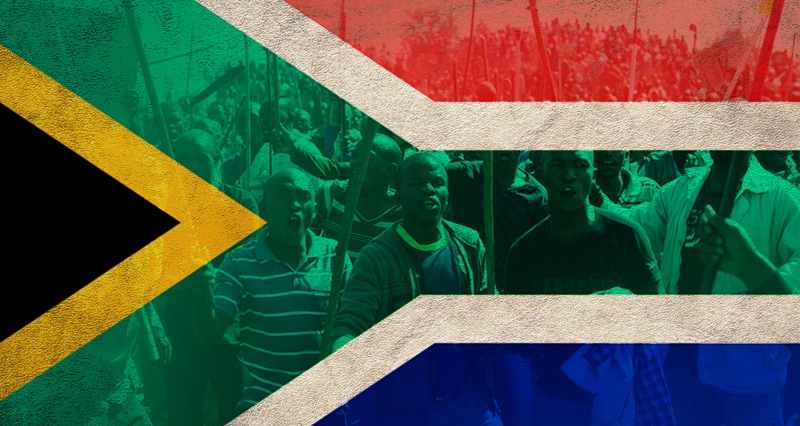





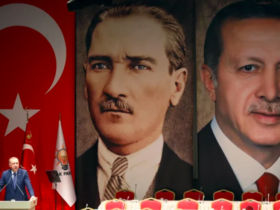
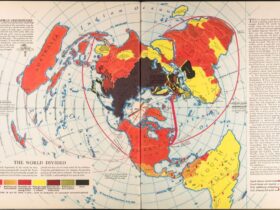


Leave a Reply